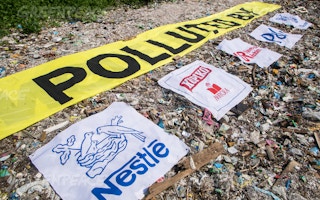A commitment made by more than 250 companies to tackle plastic pollution has been cautiously welcomed by green groups who say the pledge does not go far enough to reduce plastic use in products and packaging.
To continue reading, subscribe to Eco‑Business.
There's something for everyone. We offer a range of subscription plans.
- Access our stories and receive our Insights Weekly newsletter with the free EB Member plan.
- Unlock unlimited access to our content and archive with EB Circle.
- Publish your content with EB Premium.
The New Plastics Economy Global Commitment was announced today at the Our Ocean Conference in Bali, and saw companies including Danone, Mars, PepsiCo, Unilever and Coca-Cola commit to eliminate disposable plastic straws, cutlery and cups and unnecessary packaging, design products for reuse and recycling, and support the development of a circular economy for plastic.
The pledge, which was made by companies identified as the world’s biggest plastic polluters in a worldwide study of beaches, rivers, parks and streets earlier this month, was supported by the United Nations Environment, World Wide Fund for Nature (WWF), World Economic Forum and Ellen MacArthur Foundation.
“
If we continue down this current path, global plastic production will double in twenty years and quadruple by 2050. Unless corporations are held accountable to ambitious and mandatory reduction targets, we won’t be able to tackle the problem at the source and efforts like the Ellen MacArthur Foundation pledge will not change much.
Ahmad Ashov, global project leader, Greenpeace Indonesia
An open letter from the collective, titled “Drawing a line in the sand”, called on businesses and governments to work together to tackle plastic waste and pollution at source.
Greenpeace said that while the pledge shows companies moving in the right direction, it gives them too much flexibility to prioritise recycling over reduction and reuse, and does not commit them to actual targets to cut the total amount of disposable plastic they use.
Washing DC-based green group Oceana was also tough on the pledge, calling the promises it makes “vague” and evidence that consumer goods companies “refuse to think outside the plastic bottle and bag.”
“To have an impact, these companies must reduce the amount of single-use plastic at the source – in the factory – before it gets to consumers,” said Oceana’s chief policy officer Jacqueline Savitz in a statement.
“We need to move on from plastic bottles, bags, lids and yes, straws. Recent beach cleanups have found plastic waste from Danone, Indofood, Unilever and others on Indonesia’s beaches. Yet none of these companies have committed to stop using plastic, to stop putting plastic into consumer products, or to even offer consumers alternatives.”
A recent study by Greenpeace, A Crisis of Convenience: The corporations behind the plastics pollution pandemic, found that current plastic action plans of 11 companies, including Danone, Unilever, Procter & Gamble, Coca-Cola, and Colgate-Palmolive, enable them to increase their use of single-use plastics while none have set clear targets for elimination or reduction.
News of the pledge comes the week after a consortium of companies including Coca-Cola, Unilever, P&G, Danone and Dow started a US$90 million fund to find solutions to combat marine plastic pollution in Asia. The aim of the fund is to invest in waste and recycling infrastructure development in the region.
Global consumption of plastic will continue to rise over the next 15 years, driven by demand for consumer goods in the developing world, according to a study by the International Energy Agency released in October. Plastic demand has nearly doubled since 2000 and could double again in 20 years at the current rate of use.










